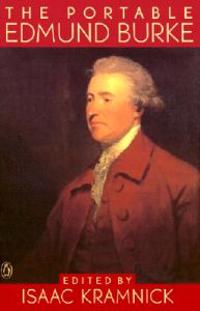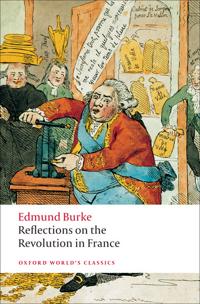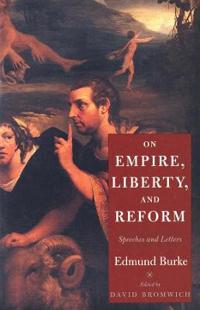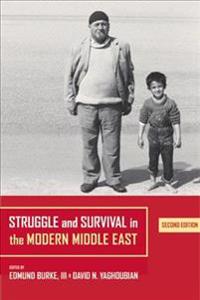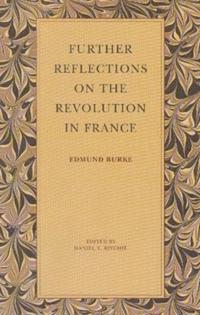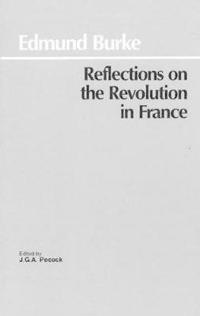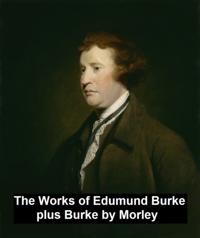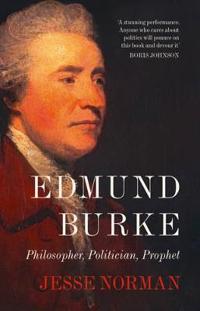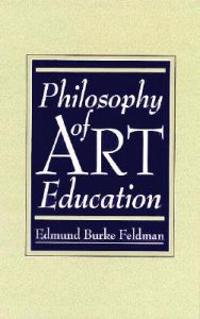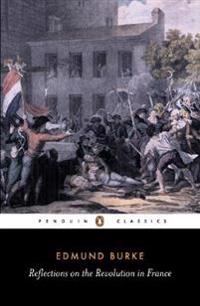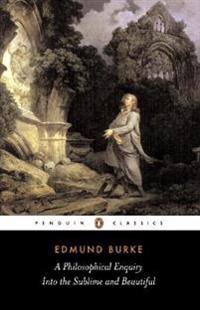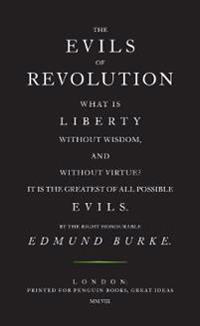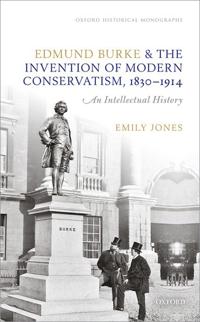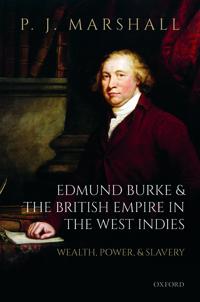The Portable Edmund Burke (Häftad)
avEdmund Burke, Isaac Kramnick, Isaac Kramnick
ISBN: 9780140267600 - UTGIVEN: 199907The intellectual wellspring of modern political conservatism, Edmund Burke is also considered a significant figure in aesthetic theory and cultural studies. As a member of the House of Commons during the late eighteenth century, Burke shook Parliament with his powerful defense of the American Revolu[...]
Writings and Speeches of Edmund Burke, The: Volume 7: India - The Hastings Trial, 1789-1794 (Inbunden)
avEdmund Burke
ISBN: 9780198208099 - UTGIVEN: 2000-04-13Writings and Speeches of Edmund Burke, The: Part 1: The Revolutionary War, 1794-1797: Part 2: Ireland (Inbunden)
avEdmund Burke
ISBN: 9780198217879 - UTGIVEN: 1991-11-21Writings and Speeches of Edmund Burke, The: Volume 3: Party, Parliament and the American War, 1774-1780 (Inbunden)
avEdmund Burke
ISBN: 9780198224143 - UTGIVEN: 1996-09-19Writings and Speeches of Edmund Burke, The: Volume 1: The Early Writings (Inbunden)
avEdmund Burke
ISBN: 9780198224150 - UTGIVEN: 1997-06-26Writings and Speeches of Edmund Burke, The: Volume 5: India; Madras and Bengal, 1774-1785 (Inbunden)
avEdmund Burke
ISBN: 9780198224174 - UTGIVEN: 1981-07-23Writings and Speeches of Edmund Burke, The: Volume VIII: French Revolution, 1790-1794 (Inbunden)
avEdmund Burke
ISBN: 9780198224228 - UTGIVEN: 1990-03-01Reflections on the Revolution in France: And on the Proceedings in Certain Societies in London Relative to That Event (Pocket)
avBurke, Edmund, Iii
ISBN: 9781108061285 - UTGIVEN: 2013-08-22Reissued here is one of the most influential works of Western political thought and rhetoric, first published in 1790.[...]
Reflektioner om den franska revolutioner (Häftad)
avBurke, Edmund
ISBN: 9789186092214 - UTGIVEN: 1989-12-31Reflections on the Revolution in France (Pocket)
avEdmund Burke, L. G. Mitchell, Edmund Burke
ISBN: 9780199539024 - UTGIVEN: 200906Edmund Burke was the dominant political thinker of the last quarter of the eighteenth century in England. His reputation depends less on his role as a practising politician than on his ability to set contemporary problems within a wider context of political theory. Above all, he commented on change.[...]
On Empire, Liberty, and Reform (Pocket)
avEdmund (EDT) Burke, David (EDT) Bromwich, Edmund (EDT) Burke
ISBN: 9780300081473 - UTGIVEN: 2000-04The great British statesman Edmund Burke had a genius for political argument, and his impassioned speeches and writings shaped English public life in the second half of the eighteenth century. This anthology of Burke's speeches, letters, and pamphlets, selected, introduced, and annotated by David Br[...]
Struggle And Survival In The Modern Middle East (Pocket)
avEdmund (EDT) Burke, David N. (EDT) Yaghoubian, Edmund (EDT) Burke
ISBN: 9780520246614 - UTGIVEN: 2005-11Until the 1993 first edition of this book, one thing had been missing in Middle Eastern history - depiction of the lives of ordinary Middle Eastern men and women, peasants, villagers, pastoralists, and urbanites. Now updated and revised, the second edition has added six new portraits of individuals [...]
Further Reflections on the Revolution in France (Pocket)
avEdmund Burke, Daniel E. Ritchie, Edmund Burke
ISBN: 9780865970991 - UTGIVEN: 1992-04In his famous "Reflections on the Revolution in France" (1790), Edmund Burke excoriated French revolutionary leaders for recklessly destroying France's venerable institutions and way of life. But his war against the French intelligentsia did not end there, and Burke continues to take pen in hand ag[...]
Reflections on the Revolution in France (Pocket)
avEdmund Burke, J. G. A. Pocock, Edmund Burke
ISBN: 9780872200203 - UTGIVEN: 1987-09John Pocock's edition of Burke's Reflections is two classics in one: Burke's Reflections and Pocock's reflections on Burke and the eighteenth century.[...]
Works of Edmund Burke, plus Burke
ISBN: 9781455426065 - UTGIVEN: 2018-03All 12 volumes of Burke's works, from the edition first published in 1887, plus a biography of Burke by John Morley. According to Wikipedia: "e;Edmund Burke (1729-1797) was an Irish statesman, author, orator, political theorist, and philosopher, who served for many years in the British House of [...]
Edmund Burke (Inbunden)
avJesse Norman
ISBN: 9780007489626 - UTGIVEN: 201305Both conservative and subversive, Burke's beliefs have never been more relevant than in today's 'Big Society', as MP Jesse Norman explains.[...]
Edmund Burke (Häftad)
avJesse Norman
ISBN: 9780007489640 - UTGIVEN: 2014-05Longlisted for the Orwell Prize and the Samuel Johnson prize for non-fiction; both conservative and subversive, Burke's beliefs have never been more relevant, as MP Jesse Norman explains.[...]
Philosophy of Art Education (Häftad)
avEdmund Burke Feldman
ISBN: 9780132308304 - UTGIVEN: 199509Appropriate for undergraduate and graduate level college courses in education, elementary education, art education, philosophy, and various courses in the humanities. The primary aim of the text is to raise the questions and issues which should be of importance to art teachers by relating the pract[...]
Reflections on the Revolution in France (Storpocket)
avEdmund Burke
ISBN: 9780140432046 - UTGIVEN: 198209Burke's seminal work was written during the early months of the French Revolution, and it predicted with uncanny accuracy many of its worst excesses, including the Reign of Terror. A scathing attack on the revolution's attitudes to existing institutions, property and religion, it makes a cogent case[...]
A Philosophical Enquiry into the Sublime and Beautiful (Storpocket)
avEdmund Burke
ISBN: 9780140436259 - UTGIVEN: 199811Edmund Burke was one of the foremost philosophers of the eighteenth century and wrote widely on aesthetics, politics and society. In this landmark work, he propounds his theory that the sublime and the beautiful should be regarded as distinct and wholly separate states - the first, an experience ins[...]
The Evils of Revolution (Pocket)
avEdmund Burke
ISBN: 9780141036809 - UTGIVEN: 200808Written at a time when most of Europe supported the French Revolution, Edmund Burke's prescient and, at the time, controversial denunciation of its mob rule predicted the Terror, began the modern conservative tradition and still serves as a warning to those who seek to reshape societies through viol[...]
Edmund Burke and the Invention of Modern Conservatism, 1830-1914
ISBN: 9780198799429 - UTGIVEN: 2017-04Between 1830 and 1914 in Britain a dramatic modification of the reputation of Edmund Burke (1730-1797) occurred. Burke, an Irishman and Whig politician, is now most commonly known as the 'founder of modern conservatism' - an intellectual tradition which is also deeply connected to the identity of th[...]
Edmund Burke and the Invention of Modern Conservatism, 1830-1914 (häftad)
ISBN: 9780198831334 - UTGIVEN: 2019-02Between 1830 and 1914 in Britain a dramatic modification of the reputation of Edmund Burke (1730-1797) occurred. Burke, an Irishman and Whig politician, is now most commonly known as the 'founder of modern conservatism' - an intellectual tradition which is also deeply connected to the identity of th[...]
Edmund Burke
ISBN: 9780199226634 - UTGIVEN: 2008-10Edmund Burke (1730-1797) was one of the most profound, versatile, and accomplished thinkers of the eighteenth century. Born and educated in Dublin, he moved to London to study law, but remained to make a career in English politics, completing A Philosophical Enquiry into the Origin of Our Ideas of t[...]

